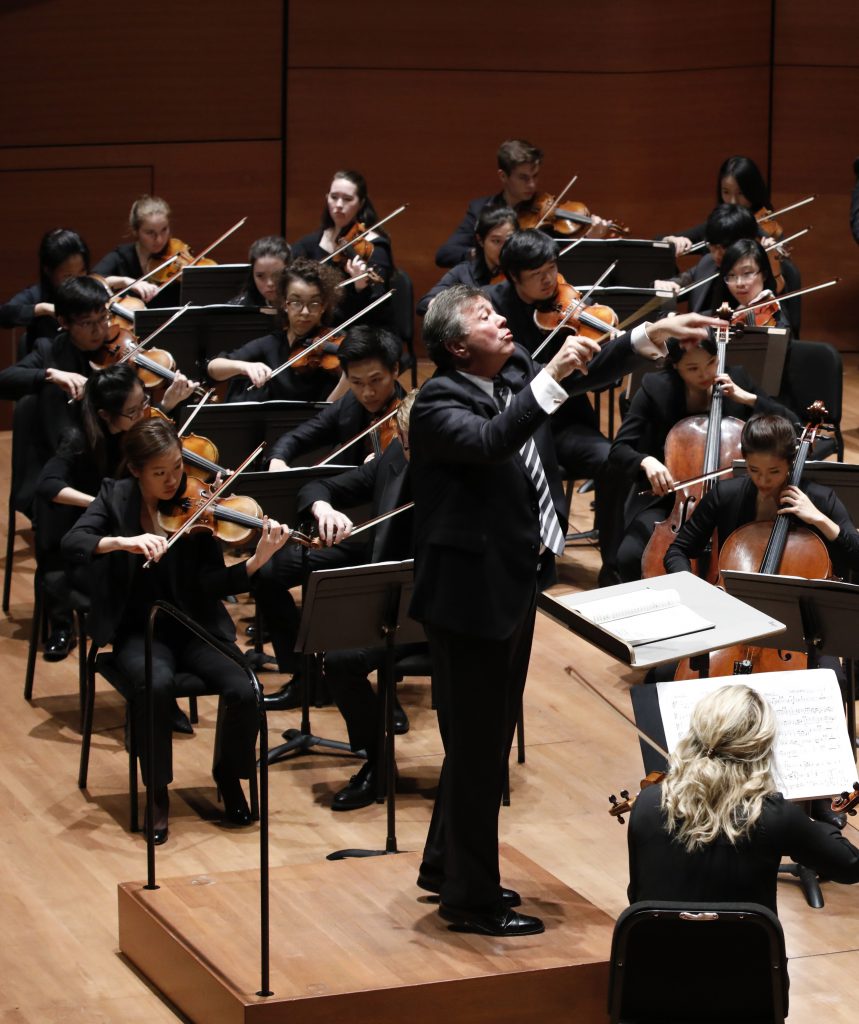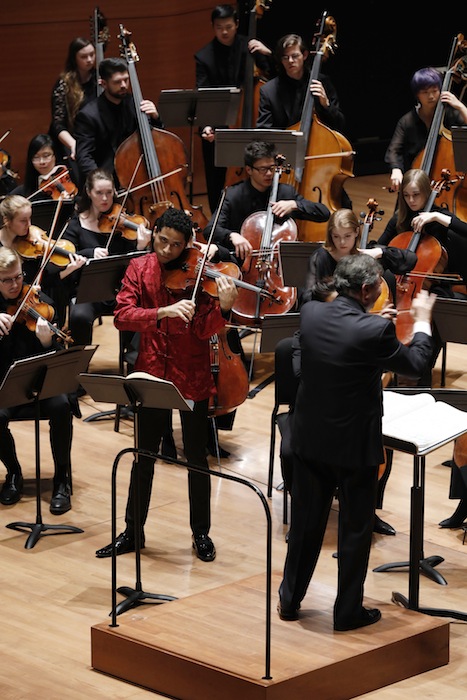Schwarz, Juilliard Orchestra deliver stellar advocacy for neglected American composers

Gerard Schwarz conducted the Juilliard Orchestra in works by David Diamond, William Schuman and Jacob Druckman Thursday night.
In the middle of the last century, there was a group of American composers who wrote symphonies. Their collected body of work carved out a specific, national sound—skyscrapers and sleek, powerful automobiles, urban sophistication expressed in clear and straightforward language—and did more than the work of John Cage or Steve Reich to make the 20th century an American one for classical music.
Charles Ives and Aaron Copland were specifically not part of this cohort. William Schuman, David Diamond, Walter Piston, Peter Mennin, and others eschewed the self-conscious “American” sound of Ives and Copland, they were modernists working within the classical tradition but without ideology, whether populist or academic—they assumed the worth of the classical tradition and the open-minded intelligence of their audience. Their music reflects New York City in an era when everything seemed possible.
Yet without conductors like Gerard Schwarz this music would remain even more lost, as it incomprehensibly has been for almost sixty years, with the rare exceptions amounting to little more than dutiful condescension.
Thursday night in Alice Tully Hall, Schwarz led the Juilliard Orchestra in Schuman’s Symphony No. 6, David Diamond’s Symphony No. 4, and the Concerto for Viola and Orchestra from Jacob Druckman. And for 90 minutes it again felt like all things were possible.
The last time the New York Philharmonic played these two symphonies was 1958. Their most recent Schuman performance was Andre Previn leading Symphony No. 3—his most prominent work—in 1997. Based on the parochialism of prestige in this city’s culture, that is beyond bizarre.
Nothing could be more fitting than Juilliard musicians bringing life to his substantial Sixth Symphony. Schuman—a native New Yorker who switched from business to start composing at age 20,managed to tear his attention away from baseball to compose around 70 pieces. He was president of Juilliard from 1945 to 1962, during which time he turned it into the modern institution it remains today.
He was also the first president of Lincoln Center and served until 1969. One would expect monuments to him. At least there was this energetic, passionate performance that completed the concert.
Schuman’s Symphony No. 6 is from 1948. Like most of the symphonies of his peers, it’s not about anything in particular except the art of making music. Yet his voice is immediately identifiable. Neoclassical in general, these pieces expressed the virtues of counterpoint, development, and formal structure. To this Schuman added a poly-harmonic language, stacking related triads on top of each other to produce a sound that is tonal but floats free of the usual expectations of harmonic motion.
The Juilliard Orchestra made a big, meaty sound with this, although there were times when the density of the writing turned muddy. There is a coiled physical and psychological energy in this symphony that the players expressed with a real poignancy. It is easy to hear the national exhaustion after WWII in the music, and Thursday night it was also easy to hear a fraught outlook toward the future.
Schoenberg told Diamond that the latter should avoid learning serial technique because he was “a new Bruckner.” That’s not too far off–his symphonies express, in the composer’s words, “strong melodic contours [and] good rhythmic variety and counterpoint.”
He called the Fourth, from 1945, “my smallest large symphony,” and it is indeed a compact, succinct three movements while still having Diamond’s sense of bigness; big, rich sound and a big expressive embrace.
The opening dozen bars, with their polyphony and cascading harmonies, are some of the most beautiful in all the symphonic literature. Opening the concert with the Fourth, Schwarz– a more dedicated advocate of these composers than even Bernstein–maintained smooth, loping tempos throughout, and the musicians produced a gorgeous sound. They didn’t have the professional level of blend, but the music unfolded in phrases that captured Diamond’s art, and the interplay between sections was excellent.

Jordan Bak performed Jacob Druckman’s Viola Concerto Thursday night.
Jordan Bak was the soloist in Druckman’s Viola Concerto, from 1978. Another important New York composer, Druckman was the Philharmonic’s composer in residence from 1982 to 1986 (has son Daniel is a percussionist in the orchestra) and taught at Juilliard and Brooklyn College.
The concerto had a more abstract form than the symphonies, and included an identifiable 12-note row, but as in the others the language was clear and intelligent without being academic or solipsistic. The form is antiphonal, an agon, and Bak was dazzling. A graduate student at Juilliard, he played with a full-bodied sound and exacting intonation and articulation. He overshadowed the composition in that his playing was so constantly involving and impressive that one was drawn to each note and phrase, and often lost the forest for the tree. But what a tree.
This music and these composers, especially Schuman and Diamond, are crying out for performances from professional orchestras. One hopes that last night, someone across the street in David Geffen Hall was listening.
Thomas Adès conducts the Juilliard Orchestra in his own music and that of Elgar and Stravinsky 7:30 p.m. November 13. juilliard.edu